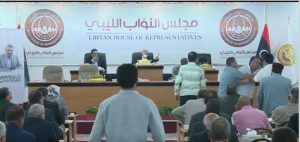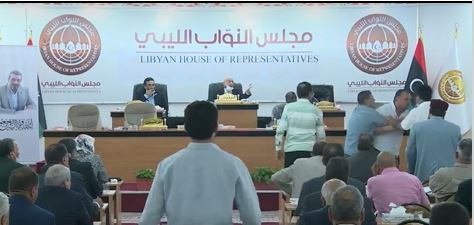By Sami Zaptia.

London, 18 August 2021:
In a rowdy session yesterday, Libya’s parliament, the House of Representatives (HoR), approved the law to elect Libya’s next president through a direct popular vote on 24 December 2021.
The rowdy session was broadcast live by the HoR’s own TV station, Mustaqbal Channel, and the sound had to be muted on several occasions and eventually picture transmission was stopped when members looked as if they started fighting.
Western Libya reports say the disrupter was objecting to parts of the law that may have prevented Khalifa Hafter from standing for the presidential elections or returning to his post if he failed to win the elections. HoR head Ageela Saleh threatened to have security eject the rowdy member just before transmission was cut.
The session and transmission were restored later, and the election law was passed unanimously. It was then referred to the Legal and Constitutional Committee for final drafting.
The third budget draft was circulated
The Official Spokesperson for the HoR, Abdalla Belheeg, also confirmed that the third draft of the 2021 budget to be received from the government was circulated to members for possible consideration at next Monday’s session.
Unilateral move?
On the face of it, the approval by parliament yesterday of one half of the election law (the parliamentary election law still needs to be approved) may give the impression that Libya is inching closer to holding the 24 December 2021 elections.
However, it will be recalled that the passage of this law has been conducted by the HoR unilaterally and without ‘‘consulting’’ the High State Council (HSC). Libya’s current political Roadmap, the Skhirat 2015 Libyan Political Agreement (LPA), stipulates that the HoR must ‘‘consult’’ the HSC on major decisions.
The HSC considers the holding of elections a major decision. The HoR has not consulted it on this election law, if consult means obtaining approval.
HoR’s alternative reading of the LPA
However, the HoR has an alternative reading of the LPA and believes that the subsequent Libyan Political Dialogue Forum’s (LPDF) Roadmap makes the timely holding of the 24 December 2021 elections imperative and thus supersedes the LPA. The HoR believe that the HSC is being obstructionist on all fronts and is not interested in holding the elections.
A referendum on the draft constitution
The HSC wants the elections to be held only after a popular referendum on the draft constitution is held and only if the public approves the draft constitution. However, the drafting law for the constitution stipulates that the draft constitution must be consensual and approved by Libya’s ethnic minorities.
Ethnic minorities disapprove of the draft constitution
The Amazigh minority withdrew from the drafting process, boycotting the eventual draft presented to and approved by parliament. This means that it is very likely that the draft constitution and any subsequent elections held based on it will be successfully challenged in a court of law. This could make the next elections, if successfully held, null and void.
A short-term fix out of the 10-year political quagmire?
The next elections could be just a short-term fix. However, many Libyans, UNSMIL and the international community see it as the only way out of Libya’s catch-22. They see it as a necessary evil to extricate Libya out of its ten-year transitional political quagmire that it has found itself stuck in since the 2011 revolution that overthrew the Qaddafi regime.
Status quo anti-election forces
They see the status quo forces in western and eastern Libya including militias, the HSC, HoR and maybe Khalifa Hafter, as paying lip service to elections while working in the background to scupper them.
Elections for the sake of elections
There is also a school of thought that holding yet another set of elections, like the 2012 and 2014 elections, would only act as a centrifugal force as opposed to a centripetal force, causing more chasms and divisions in the country than unifying it.
They believe elections must be held after more reconciliation and agreement is reached on the country’s social contract rather than after it.
Need for strong, legitimate, mandated government
From a practical point of view, the international community needs one strong, legitimate, empowered Libyan interlocutor to deal with in order to be able to help it move the country forward.
This stronger legitimate government would have the mandate to make strong and often difficult decisions to reform the Qaddafi-era inherited system to improve the provision of desperately needed services to the Libyan public.
They see early elections as the quickest but not necessarily final step to this scenario.








